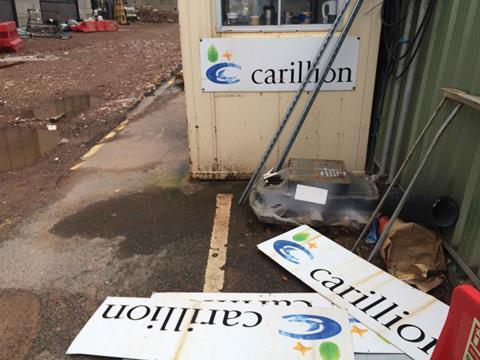Doing the same things over and over isn’t working anymore. Surely it’s worth trying something different, writes Dave Rogers
This is the gist of a recent conservation with the chief executive of a household name in the construction industry.

“Have you heard anything about such and such a company?” he asked. A few things, but nothing out of the ordinary was the reply. “Anything happens and it would be bigger than Carillion.” How come? “If anything happened,” he continued, “I’d be really worried about the supply chain. A lot might not be able to take it.”
Rumours are just that – and in this case they eventually quietened down – but it shows the febrile atmosphere in contracting at the moment.
When comparisons are made with Carillion, then it would seem that things are pretty bad. This year, especially in recent months, there have been a series of events which have added to a sense that something in contracting is fundamentally broken.
>> Also read: Why I have always admired contractors (by an architect)
So far in 2023, the following has happened: Tolent, a well-respected regional contractor, went bust in February. In the summer, Buckingham, the go-to stadium builder of this industry, went bust. At the start of this month, London M&E specialist MJ Lonsdale went bust.
Several big contractors have recently put out dire annual numbers. The UK arms of Vinci and Bouygues, both part of much larger French parents, have racked up losses in excess of £40m.
Building has been told by several sources that one contractor has, to put it mildly, lost a lot of money on a big scheme in London
In September, Laing O’Rourke admitted that it was in negotiations with its client on its £600m Olympia scheme over a significant amount of money it says it is due on the job. “The UK market has been reshaped by 18 months of upheaval, which has caused significant cost pressures, rising inflation and increased cost of capital,” a Laing O’Rourke spokesperson told Building by way of explanation.
Elsewhere, Building has been told by several sources that one contractor has, to put it mildly, lost a lot of money on a big scheme in London.
Meanwhile, the HS2 leg up to Crewe and Manchester has been cancelled by the prime minister, meaning gaps in workloads need to be plugged. Now the housebuilder Vistry is putting the squeeze on its supply chain by asking them to agree to a 10% cut on prices for existing and future jobs.
The discussions have been “positive”, the firm says, but it feels worth mentioning that it went to subcontractors asking for the cuts, not the other way around.

This week, financial advisory firm Kroll said administrations among construction companies are on the rise this year and Sarah Rayment, its managing director, said: “It is unsurprising that construction continues to lead the way, with traditionally low margins leaving little breathing space.”
It all feels that right now is an incredibly difficult time to be a contractor – much harder than normal.
Construction lawyer Rudi Klein, for so long a champion of the specialists, said: “The supply chain is facing its greatest risk from upstream insolvencies for at least 15 years. Trade credit insurance is being withdrawn or reduced, thus increasing the risk for those SMEs which can still afford the premiums.
“Tier 1 contractors are underbidding more and more and clients are putting off start dates for projects, adding to desperate pressures already on the supply chain. Clients, especially public sector clients, have not internalised the seriousness of the situation.”
In its latest accounts, Vinci blamed the impact of fixed-price contracts for sending it to a £44m pre-tax loss from a £24m profit last time – a swing of £68m.
Inflation and subcontractor failures did for Bouygues’ numbers, too, with that business slumping to a £42m loss.
Both are part of much bigger organisations in France but the bean-counters across the Channel in Paris will surely only put up with so much before they wonder: why bother?
Vinci singled out two fixed-price jobs where it had lost money. In the accounts, the firm said that “it had decided to stop entering medium and long-term contracts if they do not include fair price adjustment clauses”.
Over the summer, John Sisk said its performance had been hit by the ongoing effects of covid-19 as well as “the impact of energy costs on fixed-price contracts”.
I think we have a very testing 12 months ahead. The consultant and client world needs to step up and take responsibility for the health of our construction market
Major industry client
Buckingham’s administrator Grant Thornton said the firm was hobbled by “significant and increasing losses” on several sport and leisure schemes, which it put down to “inflationary pressures”. Buckingham went down owing the supply chain £108m. Two firms were owed more than £4m each.

There is a pattern emerging here which makes it seem inevitable that more and more contractors will simply not tender fixed jobs because the risk is too great.
“I think we have a very testing 12 months ahead,” one major client said. “The consultant and client world needs to step up and take responsibility for the health of our construction market.
“Stop pushing risk down the supply chain. It’s far too fragile right now.”
>>See also:Why are you still participating in the race to the bottom?
>> See also: Marginal gains: Why contractors need help to make a bigger profit
>> See also: Laing O’Rourke and client in talks over cost of design changes on £600m Olympia scheme
Those who have been in the industry a while sense there is a storm brewing. “In a relatively short space of time, we have had covid, then inflation following [the] Ukraine [war] and there is less work around,” says one boss. “It has weakened a lot of organisations.”
Those firms with good balance sheets – Morgan Sindall, Galliford Try and Balfour Beatty stand out among the listed contractors – seem better set to withstand the headwinds. John Morgan at Morgan Sindall Bill Hocking, his counterpart at Galliford Try, have both stressed the importance of building up a decent balance sheet.
In August, announcing improved interim results, Morgan Sindall chief executive Morgan said: “Our strong balance sheet, with a substantial net cash position, allows us to continue operating efficiently and effectively and to focus on making the right decisions to drive for long-term sustainable growth.”
A month later it was the turn of Hocking to pipe up for financial prudence. Galliford Try remained debt free in the year to June, he said, and had average month-end net cash of £135m.
Hocking added that subcontractors were reassured by the company’s balance sheet. “It’s very important because they know they will get paid.”
In its interim results, Balfour Beatty boss Leo Quin called his firm’s net cash position of £695m “sector-leading”, which gave the company “confidence in profitable managed growth”.
Those balance sheets have not just happened overnight, as one rival chief executive admiringly points out. “Those firms are plcs, they’re not lifestyle businesses. You can’t take money out of a business to finance a lifestyle. You have to leave money in for the rainy days.”
Not everyone who experiences financial peril does that, of course. Some are just caught out by a job that goes wrong at a price that was wrong in the first place.
What other industries put people at huge risk for a 3% margin – if you’re lucky?
Industry consultant

But the problem is that, with margins so thin, it doesn’t take much for a small issue to snowball and become much bigger and much more serious. “What other industries put people at huge risk for a 3% margin – if you’re lucky,” says one consultant.
“The focus should be on quality, people and doing a good job – not lowest cost all the time, which will always drive behaviours in an inevitable direction. This inevitability will always result in disappointment.”
In the absence, then, of any definitive answer as to what to do, perhaps it is time to revisit the words of Scape chief executive Mark Robinson from earlier this year.
This is what he told Building in April. “Let’s fix the profit for the delivery partners so they can worry about delivering the project and focus on the project.”
In other words, set profit margins at an agreed figure – his is 5% – and it will revolutionise how clients commission work and how the industry operates.
Clients would have transparency and not have to wonder whether budgets were being inflated by firms to squeeze more money out of jobs. And contractors could be left to get on and build what they have been asked to without steeling themselves for post-project disputes.
“Arguing about cost does affect productivity and, if you fix it, all that goes away,” Robinson added. “This one change could revolutionise how clients commission work and how the industry operates.”
Call him naive, an idealist, living in la-la land or whatever. But right now Robinson’s proposal seems a pretty decent shout. Firms should go bust because they are incompetent, badly run and do a terrible job. But not because the cards are stacked against them and the best they can hope for is a 1% profit.
Dave Rogers is deputy editor of Building
The Building the Future Commission

The Building the Future Commission is a year-long project, launched to mark Building’s 180th anniversary, to assess potential solutions and radical new ways of thinking to improve the built environment, with thanks to our national headline sponsors Fenwick Elliott and Gleeds.
The major project’s work will be guided by a panel of 19 major figures who have signed up to help guide the commission’s work culminatuing culminate in a report published at the end of the year.
The commissioners include figures from the world of contracting, housing development, architecture, policy-making, skills, design, placemaking, infrastructure, consultancy and legal.
They include Katy Dowding, executive vice president at Skanska, Richard Steer, chair of Gleeds, Lara Oyedele, president of the Chartered Institute of Housing, Mark Wild, former boss of Crossrail and chief executive of SGN, and Simon Tolson, senior partner at Fenwick Elliott. See the full list here.
The project is looking at proposals for change in eight areas:
- Education and skills
- Housing and planning
- Energy and net zero
- Infrastructure
- Building safety
- Project delivery and digital
- Workplace culture and leadership
- Creating communities
>> Editor’s view: And now for something completely positive – our Building the Future Commission
>> Click here for more about the project and the commissioners
Building the Future is also undertaking a countrywide tour of roundtable discussions with experts around the regions as part of a consultation programme in partnership with the regional arms of industry body Constructing Excellence. There is also a young person’s advisory panel.
























2 Readers' comments